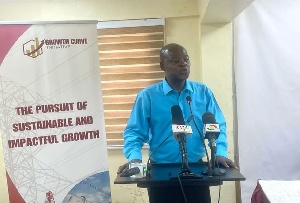Business News of Thursday, 3 April 2025
Source: www.ghanawebbers.com
CSOs push for local content, worker protection in ECG reform talks
During a recent meeting in Accra, CSO representatives met with Minister of Energy and Green Transition, John Abu Jinapor. They acknowledged the government's concerns about ECG's financial struggles. The main issue is ECG's difficulty in collecting enough tariff revenue to pay Independent Power Producers (IPPs).
The minister highlighted that this challenge threatens power supply reliability. He emphasized the need for reform and mentioned exploring a Public-Private Partnership (PPP) model. This model aims to improve revenue collection efficiency and enhance customer experience.
At a press conference, coalition member Benjamin Nsiah shared key issues discussed with the minister. While CSOs support reforms, they urged prioritizing local participation in any partnership agreement. They also sought assurances that ECG employees' livelihoods would be protected under new arrangements.
This push for reform comes amid pressure to stabilize Ghana’s power sector. The sector has faced financial constraints and supply disruptions. The group noted that the minister agreed to their demands.
On governance, CSOs urged the ministry to protect power policies from political interference. They called for a long-term strategy to meet rising electricity demand while integrating technology advancements. Additionally, they recommended allowing IPPs to procure their own fuel for generation.
The CSOs argued this would reduce dependence on intermediaries and lower costs. They recognized Ghana's slow pursuit of green energy investments and urged faster integration of renewables into the national energy portfolio. This should include incentives for energy diversification aligned with global climate goals.
They also emphasized incentivizing private companies with large carbon footprints to invest in off-grid solutions and carbon sequestration projects. Furthermore, they challenged the ministry to insulate energy policies from political influence to enhance efficiency.
The coalition supported the minister’s proposal for a comprehensive strategy on power generation. This strategy should keep pace with rising energy demands and technological advancements.
Beyond power, CSOs proposed revising taxation policies for oil and gas services like infrastructure and transportation. Lowering tax burdens could encourage private-sector investment and improve efficiency.
The coalition stated there must be synergy between Ghana’s fossil fuel resources and renewable ambitions. They stressed avoiding premature stranding of oil and gas assets while ensuring responsible integration into the transition process.
To attract more Foreign Direct Investment (FDI), CSOs called for greater transparency in licensing bid rounds. They recommended improvements in seismic data collection and block size assessments as well.
Additionally, they suggested pausing promotional roadshows by GNPC until regulatory barriers are addressed. The 19-member coalition includes various organizations such as Growth Curve Initiative, Civil Society Platform on Oil and Gas (CSPOG), CEDA, NRGI, and COPEC among others.











